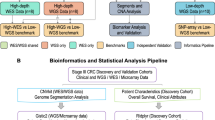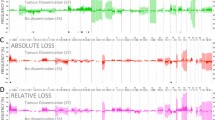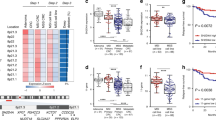Abstract
Loss of function of tumor suppressor genes is a condition necessary for the development of colorectal cancer (CRC). Deletions of the long arm of chromosome 18 are present in approximately 70% of CRCs, and this site contains several genes that regulate cellular functions implicated in tumorigenesis, including cell migration, proliferation, and differentiation. Recently, genome-wide association studies also showed a relationship between specific loci on 18q and risk of developing CRC. The presence of 18q loss in tumors has also been associated with poor outcome following CRC treatment. However, despite the more than 20 years since its identification in CRC, we still lack an adequate understanding of the clinical significance of 18q loss. This review details the existing data on the relationship between tumor 18q loss of heterozygosity (18qLOH) and treatment outcome for patients with CRC.

Similar content being viewed by others
References
Papers of particular interest, published recently, have been highlighted as: • Of importance
Vogelstein B, Fearon ER, Hamilton SR, et al.: Genetic alterations during colorectal-tumor development. N Eng J Med 1988, 319:525–532.
Thibodeau S, Bren G, Schaid D: Microsatellite instability in cancer of the proximal colon. Science 1993, 260:616–619.
Watanabe T, Wu T-T, Catalano PJ, et al.: Molecular predictors of survival after adjuvant chemotherapy for colon cancer. N Eng J Med 2001, 344:1196–1208.
Samowitz WS, Curtin K, Ma KN, et al.: Microsatellite instability in sporadic colon cancer is associated with an improved prognosis at the population level. Cancer Epidemiol Biomarkers Prev 2001, 10:917–932.
Ribic CM, Sargent DJ, Moore MJ, et al.: Tumor microsatellite-instability status as a predictor of benefit from fluorouracil-based adjuvant chemotherapy for colon cancer. N Engl J Med 2003, 349:247–257.
Fearon ER, Cho KR, Nigro JM, et al.: Identification of a chromosome 18q gene that is altered in colorectal cancers. Science 1990, 247:49–56.
Shibata D, Reale MA, Lavin P, et al.: The DCC protein and prognosis in colorectal cancer. N Eng J Med 1996, 335:1727–1732.
Fazeli A, Dickinson SL, Hermiston ML, et al.: Phenotype of mice lacking functional Deleted in colorectal cancer (Dcc) gene. Nature 1997, 386:796–804.
Shin SK, Nagasaka T, Jung BH, et al.: Epigenetic and genetic alterations in netrin-1 receptors UNC5C and DCC in human colon cancer. Gastroenterology 2007, 133:1849–1857
Paradisi A, Maisse C, Coissieux M-M, et al.: Netrin-1 up-regulation in inflammatory bowel diseases is required for colorectal cancer progression. Proc Natl Acad Sci U S A 2009, 106:17146–17151.
Hahn SA, Shamsul Hoque ATM, Moskaluk CA, et al.: Homozygous deletion map at 18q21.1 in pancreatic cancer. Cancer Res 1996, 56:490–494.
Howe JR, Roth S, Ringold JC, et al.: A gene for familial juvenile polyposis maps to chromosome 18q21.1. Am J Hum Genet 1998, 62:1129–1136.
Alazzouzi AL, Mesker WE, Liefers GJ, et al.: Presence of a high amount of stroma and downregulation of SMAD4 predict for worse survival for stage I-II colon cancer patients. Cell Oncol 2009, 31:169–178.
Eppert K, Scherer SW, Ozcelik H, et al.: MADR2 maps to 18q21 and encodes a TGF-beta-regulated MAD-related protein that is functionally mutated in colorectal carcinoma. Cell 1996, 86:543–552.
Herbst A, Bommer GT, Kriegl L, et al.: ITF-2 is disrupted via allelic loss of chromosome 18q21, and ITF-2B expression is lost at the adenoma-carcinoma transition. Gastroenterology 2009, 137:639–648.
Park DY, Sakamoto H, Kirley SD, et al.: The Cables gene on chromosome 18q is silenced by promoter hypermethylation and allelic loss in human colorectal cancer. Am J Pathol 2007, 171:1509–1519.
Nusbaum C, Zody MC, Borowsky ML, et al.: DNA sequence and analysis of human chromosome 18. Nature 2005, 437:551–555.
Broderick P, Carvajal-Carmona L, Pittman AM, et al.: A genome-wide association study shows that common alleles of SMAD7 influence colorectal cancer risk. Nat Genet 2007, 39:1315–1317.
Tenesa A, Farrington SM, Prendergast JGD, et al.: Genome-wide association scan identifies a colorectal cancer susceptibility locus on 11q23 and replicates risk loci at 8q24 and 18q21. Nat Genet 2008, 40:631–637.
Zhang H, Arbman G, Sun X-F: Codon 201 polymorphism of DCC gene is a prognostic factor in patients with colorectal cancer. Cancer Detect Prev 2003, 27:216–221.
Bisgaard ML, Jager AC, Dalgaard P, et al.: Allelic loss of chromosome 2p21-16.3 is associated with reduced survival in sporadic colorectal cancer. Scan J Gastroenterol 2001, 36:405–409.
Chang S-C, Lin J-K, Lin T-C, Liang W-Y: Loss of heterozygosity: an independent prognostic factor of colorectal cancer. World J Gastroenterol 2005, 11:778–784.
Zauber NP, Wang C, Lee PS, et al.: Ki-ras gene mutations. LOH of the APC and DCC genes, and microsatellite instability in primary colorectal carcinoma are not associated with micrometastases in pericolonic lymph nodes or with patients’ survival. J Clin Path 2004, 57:938–942.
Ogunbiyi OA, Goodfellow PJ, Herforth K, et al.: Confirmation that chromosome 18q allelic loss in colon cancer is a prognostic indicator. J Clin Oncol 1998, 16:427–433.
Jernvall P, Makinen MJ, Karttunen TJ, et al.: Loss of heterozygosity at 18q21 is indicative of recurrence and therefore poor prognosis in a subset of colorectal cancers. Br J Cancer 1998, 79:903–908.
Choi S-W, Lee KJ, Bae Y-A, et al.: Genetic classification of colorectal cancer based on chromosomal loss and microsatellite instability predicts survival. Clin Cancer Res 2002, 8:2311–2322.
Halling KC, French AJ, McDonnell SK, et al.: Microsatellite instability and 8p allelic imbalance in stage B2 and C colorectal cancers. J Natl Cancer Inst 1999, 91:1295–1303.
Barratt PI, Seymour MT, Stenning SP, et al.: DNA markers predicting benefit from adjuvant fluorouracil in patients with colon cancer: a molecular study. Lancet 2002, 360:1381–1391.
• Ogino S, Nosho K, Irahara N, et al.: Prognostic significance and molecular associations of 18q loss of heterozygosity: a cohort study of microsatellite stable colorectal cancers. J Clin Oncol 2009, 27:4591–4598. This study reports data from the prospectively followed Nurses Health Study and Health Professional Follow-up Study.
Popat S, Zhao D, Chen Z, et al.: Relationship between chromosome 18q status and colorectal cancer prognosis: a prospective blinded analysis of 280 patients. Anticancer Res 2007, 27:627–634.
• Roth AD, Tejpar S, Yan P, et al.: Stage-specific prognostic value of molecular markers in colon cancer: results of the translational study on the PETACC 3-EORTC 40993-SAKK 60-00 trial. J Clin Oncol 2009; 27:169 S. Presented at the 2009 meeting of the American Society of Clinical Oncology, this abstract reports data from a prospective analysis of the relationship between 18q allelic imbalance and treatment outcome from a large adjuvant colon cancer clinical trial.
Martinez-Lopez E, Abad A, Font A, et al.: Allelic loss on chromosome 18q as a prognostic marker in stage II colorectal cancer. Gastroenterology 1998, 114:1180–1187.
Laurent-Puig P, Olschwang S, Delattre O, et al.: Survival and acquired genetic alterations in colorectal cancer. Gastroenterology 1992, 102:1136–1141.
Carethers JM, Hawn MT, Greenson JK, et al.: Prognostic significance of allelic loss at chromosome 18q21 for stage II colorectal cancer. Gastroenterology 1998, 114:1188–1195.
Kern SE, Fearon ER, Kasper WF, et al.: Allelic loss in colorectal carcinoma. JAMA 1989, 261:3099–3103.
Lindforss U, Fredholm H, Papadoglannakis N, et al.: Allelic loss is heterogeneous throughout the tumor in colorectal carcinoma. Cancer 2000, 88:2661–2667.
Font A, Abad A, Monzo M, et al.: Prognostic value of K-ras mutations and allelic imbalance on chromosome 18q in patients with resected colorectal cancer. Dis Colon Rectum 2001, 44:549–557.
Diep CB, Thorstensen L, Meling GI, et al.: Genetic tumor markers with prognostic impact in Dukes’ stages B and C colorectal cancer patients. J Clin Oncol 2003, 21:820–829.
Alazzouzi H, Lahopuro P, Salovaara R, et al.: SMAD4 as a prognostic marker in colorectal cancer. Clin Cancer Res 2005, 11:2606–2611.
Jen J, Kim H, Piantadosi S, et al.: Allelic loss of chromosome 18q and prognosis in colorectal cancer. N Eng J Med 1994, 331:213–221.
Lanza G, Matteuzzi M, Gafa R, et al.: Chromosome 18q allelic loss and prognosis in stage II and III colon cancer. Int J Cancer 1998, 79:390–395.
Popat S, Houlston RS: A systematic review and meta-analysis of the relationship between chromosome 18q genotype, DCC status and colorectal cancer prognosis. Eur J Cancer 2005, 41:2060–2070.
Jessup JM, Dobbin K, Hamilton S, et al.: Interlaboratory assay reproducibility study for loss of heterozygosity on chromosome 18 (18qLOH) in colon cancer. J Clin Oncol 2009, 27:181 s.
Disclosure
No potential conflict of interest relevant to this article was reported.
Author information
Authors and Affiliations
Corresponding author
Rights and permissions
About this article
Cite this article
Bertagnolli, M.M. Interpreting the Inconsistent Data Concerning the Role of 18qLOH as a Prognostic Marker for Colorectal Cancer. Curr Colorectal Cancer Rep 6, 158–167 (2010). https://doi.org/10.1007/s11888-010-0060-3
Published:
Issue Date:
DOI: https://doi.org/10.1007/s11888-010-0060-3




